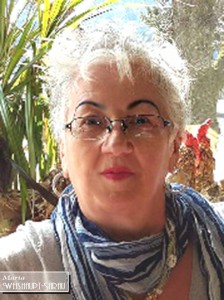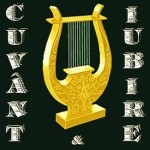Maria Weishaupt-Sarău: Poduri lirice – Poetical bridges (poeme bilingve)
 Maria Sarău s-a născut în 1949. A absolvit filologia la Institutul Pedagogic Galaţi. A lucrat ca profesor de limba română, bibliotecar, ziarist. Maria a imigrat în Elveţia în 1999. Locuieşte împreună cu soţul ei, Kark Weishaupt, la Kloten. Are doi copii adulţi din prima ei căsătorie.
Maria Sarău s-a născut în 1949. A absolvit filologia la Institutul Pedagogic Galaţi. A lucrat ca profesor de limba română, bibliotecar, ziarist. Maria a imigrat în Elveţia în 1999. Locuieşte împreună cu soţul ei, Kark Weishaupt, la Kloten. Are doi copii adulţi din prima ei căsătorie.
Maria a scris poezii din adolescenţă şi-a publicat prima carte de poezie Cad frunzele, cad şefii la editura Porto Franco Galaţi, în 2000. Apoi a publicat alte patru cărţi de poezie, ultima „Roua secretă – The Secrets Dew” în ediţie bilingvă, cu traducerea remarcabilă în engleză a profesorului şi renumitului traducător Petru Iamandi. Ea este de asemenea pasionată de pictură, oferind picturile ei în ulei sau acuarele, prietenilor români sau elveţieni.
Maria este cunoscută ca o persoană nonconformistă. De exemplu, când a publicat primul volum de poezii, a găsit un mod original de a-şi „lansa” cartea. A stat câteva ore într-o vitrină a Librăriei Centrale din Galaţi, expusă spre stradă. Aşezată pe un fotoliu, cu exemplare ale cărţii ei de jur împrejur, citea cu interes din cartea ei. Trecătorii s-au oprit, privind uimiţi la ceea ce vedeau în vitrină. Mulţi dintre ei au intrat în librărie şi-au cumpărat cartea.
Maria comentează: „Poezia înseamnă pentru mine comunicare cu universul, visare, fantezie, fiindcă recunosc sunt o veşnică romantică. Iubiţii mei scriitori sunt Eminescu şi Puşkin. Pentru că suntem trecători pe acest pământ, suntem datori să lăsăm urmaşilor noştri o zestre. Poezia nici nu moare, nici nu piere, ci rămâne. Poezia e umbra mea.”
***
Maria Sarău was born in 1949. She graduated Philology from the Pedagogical Institute Galaţi. She worked as a Romanian teacher, librarian and journalist. Maria emigrated to Switzerland in 1999. She lives with her husband, Kark Weishaupt , in Kloten. She has two adult children from her first marriage.
Maria wrote poetry in her teens and published her first book of poetry Leaves Fall, Bosses are Dismissed at Porto Franco Publishing House, Galaţi, in 2000. She published four more poetry books, the latest Roua secreta – The Secret Dew a bilingual edition, remarkably translated by Petru Iamandi, a famous English teacher and translator. She is passionate about painting, giving away her oil or watercolor paintings to her Romanian and Swiss friends.
Maria is known as a nonconformist. For example, when she published her first poetry book, she found an original way to “launch” it. She spent several hours in the Central Bookshop window in Galaţi, which is exposed to the street. She was sitting in an armchair with copies of her book around her, reading her book with interest. Passersby stopped and stared at the window. Many of them entered the bookstore and bought her book.
Maria comments: ‘To me poetry means communicating with the universe, dreaming, fantasy, because I admit I’m an eternal romantic. My beloved writers are Eminescu and Puskin. Because we only live a short amount of time on this earth, our duty is to leave a legacy to our descendants. Poetry neither dies nor perishes, but remains. Poetry is my shadow.’
***
UNDE SÃ MÃ MAI DUC, UNDE SÃ FUG?
A venit aseară un cal
c-o eşarfă la gât.
Ziua – cu şaua pe ea,
dar unde să mă duc,
unde să fug?
În uşa casei părinteşti,
însutită de nopţi, stă cheia.
Mama mea,
Cu coroana pământului pe cap
şi cu ulciorul plin de plâns,
luminează din mijlocul furtunilor.
Aş răsuci cheia în uşă,
din cheie cresc spini de metal!
Vai, mama mea nu mai este,
nici furtunile nu mai sunt furtuni.
Numai crucea de la capul ei
s-a înseninat,
umflată de ploaie.
—————————
(„Cad frunzele, cad şefii”, Editura Porto-Franco, Galaţi, 2000)
WHERE AM I GOING TO GO, WHERE SHOULD I FLEE?
Last night, a horse with a scarf around its neck
Had arrived.
The day – has the saddle on its back,
but where am I going to go,
where should I flee?
In the lock of my parents’ home door,
is the key, increased by a hundredfold nights.
My mother shines from the midst of storms
with the crown of the earth on her head
and the pitcher full of tears.
I would turn the key in the door,
but metal thorns grow from the key!
Alas, my mother is no longer here
nor the storms are storms anymore.
Only the cross at her head
has brightened,
swollen by rain.
——————————-
(„The Leaves Are Falling, The Bosses Are Dismissed”, Porto-Franco Publishing House, Galaţi, 2000)
UNEORI
Poeţii au tot timpul de lucru
până peste cap,
inclusiv
cei timizi, cu slăbiciuni şi înfumuraţii.
Recurg întotdeauna la scule puţine
şi uneori mor de dragul de a vedea şi ei
cum e
să duci cu tine un pumn de pământ
dincolo.
SOMETIMES
The poets are always busy
extremely busy,
including
the shy, the weak and the arrogant ones.
They only use a few tools
and sometimes they are dying to see how it feels
to take a handful of homeland earth
to the other side.
VENIŢI
Am noroc. Este toamnă.
Plouă.
Totul devine din ce în ce mai scump:
soarele, pietrele, amăgirile.
Elveţia e specială – fără cratiţele
de la Galaţi.
Norocul e făcut ţăndări – să nu devină
prizonierul meu.
Mamă, Tată, Ţară – veniţi la mine
cu prima corabie
în stare să treacă prin verigheta mea.
———————
(„Nicăieri şi pretutindeni”, Editura Opera Magna, Iaşi, 2005)
COME TO ME
I am lucky. It’s autumn.
It’s raining.
Everything becomes more and more expensive:
the Sun, the stones, the disappointments.
Switzerland is special – without the cooking pots
from Galaţi.
Luck is broken into pieces– so it won’t
become my own prisoner.
Mum, Dad, Country – come to me
with the first ship
able to go through my wedding ring.
————————-
(„Nowhere and Everywhere”, Opera Magna Publishing House, Iaşi, 2005)
